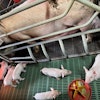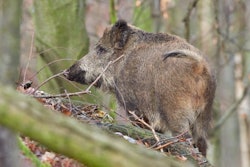
In the north Italian province of Pavia, pig farmers can look forward to the imminent easing of restrictions related introduced to control African swine fever (ASF).
For those with farms located in more than 170 municipalities in this province in the Lombardy region, this will mean they can sell their animals and products more easily. This is according to the regional agriculture councilor, reports Lombardia Notizie.
When the first cases of ASF in Pavia were confirmed during the summer, the whole province was placed under restrictions of a surveillance zone. Among other measures, this meant controls on the movement of live pigs and products within the area. However, the easing of restrictions was authorized recently by the European Commission (EC), and will come into effect once officially published.
The councilor said producers will also welcome the changes that will allow them to restock their farms with new animals.
Based on official notifications to the World Organisation for Animal Health (WOAH), Pavia’s first ever cases of ASF occurred in wild boar in mid-June. Two months later came confirmation of the province’s initial cases in domestic pigs.
Lombardy is one of eight Italian regions where ASF has been detected since the start of 2022, with Emilia-Romagna the most recent to report its first cases of the disease.
So far, ASF has been confirmed in 16 of Italy’s commercial and backyard herds — nine in Lombardy, six in Calabria, and one in Lazio.
5 European nations register new outbreaks in pigs
Over the past week, veterinary authorities of Croatia, Romania and Ukraine have officially registered further outbreaks affecting farms and backyard herds.
Based on these notifications to WOAH, three new premises have been affected by the disease in Croatia and Ukraine, and two in Romania.
Among the Ukrainian outbreaks was a first since March 2021 in the southern province of Odessa. Presence of the virus was confirmed in recent days in a herd of 28 pigs. There has also been one further outbreak at small farms in each of the central provinces of Kirovohrad and Mykolaiv.
In Croatia, the latest outbreaks were in the northeastern county of Vukovar-Srijem in districts where cases have been detected since June. Each of the affected herds comprised between 19 and 402 animals.
Both of Romania’s latest outbreaks involved small backyard herds.
So far this year, one or more outbreaks of ASF have been recorded in 16 of the nations in this region, according to the Animal Disease Information System from the EC (as of November 26). It covers notifiable diseases in member states of the European Union (EU) and most its immediate neighbors.
For the region, the outbreak total stands at 4,431. This compares with 537 recorded outbreaks in 12 European states during the whole of 2022, according to the same source. Around 60% of herds affected last year were in Romania.
Registering the most outbreaks in domestic pigs with the EC so far this year is Bosnia-Herzegovina, where the total has reached 1,477. Next come Croatia (now with a total for the year to date of 1,122), Serbia (967) and Romania (721). The next highest national total is for Ukraine (33 outbreaks for the year to date).
Since the EC’s previous update dated November 17, four countries confirmed new outbreaks — Bosnia-Herzegovina (72), Croatia (nine), Serbia (six), Romania (three) and Ukraine (two).
ASF spread continues in wild boar
So far this year, 20 countries have officially registered with the EC one or more outbreaks of the disease in their wild boar populations (as of November 26). The regional total for ASF outbreaks involving wild boar recorded through this system stands at 7,128 — 176 more than in the previous update of November 17.
For comparison, 15 European countries covered by the EC System registered a total of 7,442 outbreaks of ASF in this population in the whole of 2022.
To date this year, Poland has reported the most outbreaks in this category (2,537), followed by Italy (873), Germany (863), Latvia (647), Slovakia (523), Hungary (380) and Lithuania (371).
With the exception of Germany, all of these countries had registered new cases since the previous EC update — along with Bosnia-Herzegovina, Bulgaria, Croatia, Estonia, North Macedonia and Sweden.
While the EC does not monitor the disease situation in Russia through its information system, the national animal health agency has notified WOAH about seven new cases of ASF in its wild population.
This month, six animals tested positive for the virus in the Central federal district. These were the first cases in the Kostroma region after a brief hiatus since mid-September. Meanwhile, one more infected wild boar is reported in Nizhny Novgorod, a region in the Volga federal district.
View our continuing coverage of the global African swine fever situation.

















